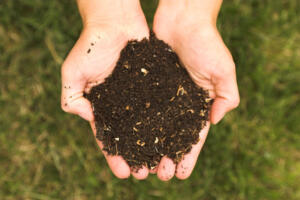Composting is a naturally occurring process that turns organic materials into a rich substance for other organisms. This rich substance is called compost.
It is a great product to enrich and grow your soil. When people mention composting, they usually mean the way to control household waste. Help it enrich the soil rather than send them to a landfill.
The benefits of composting are endless. We will mention few of them and briefly describe them.
 Improves soil structure
Improves soil structure
Soil structure is how well inorganic and organic materials found in the soil combine with each other. A healthy soil allows air, water, and materials to roam freely around the soil.
By adding compost to your yard, your soil will be enriched and improved. Compost will neutralize pH in the soil, another factor determining soil structure. If you are seeking to grow plants in your yard, it is recommended that you start composting immediately.
A tree will much more likely grow fast and provide healthy fruits in a rich and healthy soil rather than in a weak and unhealthy soil.
Less waste
Food and yard wastes make a great percentage of the total amount of waste stream, about 35%. By composting, we divert that waste from the ever-growing and disease producing landfills.
By doing this, we will save our world from additional methane and leachate that are formulated in landfills and are a very serious and imminent threat to all organisms living on earth.
These materials pollute the air we breathe as well. By composting, instead of increasing landfill size with our waste, we will enrich our soil.
Helps plants to fight diseases
According to a research initiated by University of Illinois, composting will help to maintain and control diseases, insects, and organisms that would destroy the plants if they were grown in a soil lacking rich materials.
Compost acts as a layer of defense for those plants by providing them with useful minerals to successfully defend themselves against threats that might occur.
Saves money
By composting you will not need to buy soil conditioners, bagged manure, and other products that would otherwise be required to keep your soil healthy.
You will decrease your bills as well because you will be producing a significantly less amount of trash than what you used to. In addition to this, compost prevents soil from drying out, so they will need less water than normal, saving lots of water.
Educate our children
Children learn from what we do, not what we say. By doing something that would follow laws of nature and helping plants and soil, we will give children a great lesson that they will need in the future; to treat nature and the environment well.
They will most likely follow our steps and compost in the future. Generation after generation, this action would become a habit and norm.
Controls erosion
Erosion is removal of soil from an area by wind, water, or ice. It is a serious threat to our lands. Billions of tons of rich soil are lost every single year because of erosion.
By using compost in areas with high level of erosion, we will allow a quick establishment of vegetation. According to some research, compost decreases damage caused by erosion by 86%.
Composting protects soil from erosion by increasing water infiltration in to the soil surface, increasing plant size that would cover the soil, maintain pH level in a healthy level, establish new vegetation, and many other ways.
Compost is a really effective and efficient way to transform our waste into a product that will support other organisms and species as well. It is something that we must teach our children for a better future.

